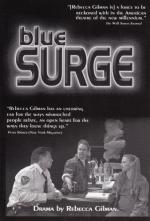|
This section contains 365 words (approx. 1 page at 400 words per page) |

|
Blue Surge Summary & Study Guide Description
Blue Surge Summary & Study Guide includes comprehensive information and analysis to help you understand the book. This study guide contains the following sections:
This detailed literature summary also contains Bibliography and a Free Quiz on Blue Surge by Rebecca Gilman.
Rebecca Gilman's Blue Surge, first produced in 2001 (and published by Faber and Faber in the same year), was a bit shocking when it first opened to enthusiastic audiences at Chicago's Goodman Theatre. It is, after all, a play about prostitutes, and it utilizes full frontal male nudity in the first scene. However, audience interest in the play stemmed more from the fact that Gilman is a local Chicago playwright, and her plays are known for their cutting-edge social commentary. Blue Surge is no exception.
The overall theme of this play is the wide gap between the people of upper-class society, with their wealth and seemingly easy lives of opportunities, and the people of the lower, working classes, with their economic and educational limits (at least in Gilman's portrayal). This gap is dramatized through the interactions of a vice-squad policeman and his interest in two women. His live-in girlfriend comes from the privileged class. She is an art student and lives off a trust fund inherited from her grandfather. The young woman with whom the policeman would like to begin a new relationship is a massage-parlor prostitute, whose only ambition is to make enough money to retire by the time she is thirty.
The title Blue Surge reflects a mixture of sadness, poverty, desire, and misunderstanding, other motifs that run through the play. There is mention in the play of a piece by the jazz master Duke Ellington called Blue Serge. The protagonist, Curt, hears the title and thinks it is Blue Surge, because he finds the music rather dark and melancholic. When Curt tells his prostitute friend, Sandy, about this misunderstanding, relating that blue serge is really a type of material used to make men's suits, Sandy imagines that perhaps the songwriter felt sad because he could not afford a suit. Thus, Gilman uses the misunderstood title of the jazz piece to pinpoint one of the messages of the play, a play in which her characters have particular longings that are difficult for them to fulfill. As Gilman portrays it, the main hindrance for those who are left wanting in their desires is poverty, and the creators of that poverty are the rich.
Read more from the Study Guide
|
This section contains 365 words (approx. 1 page at 400 words per page) |

|



